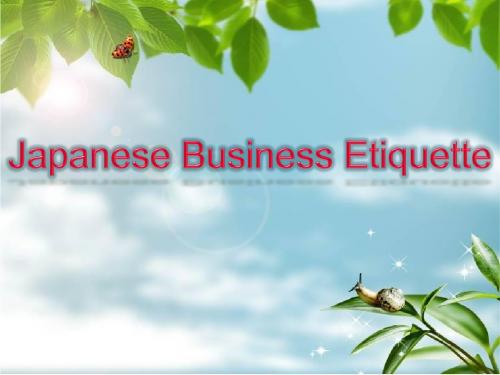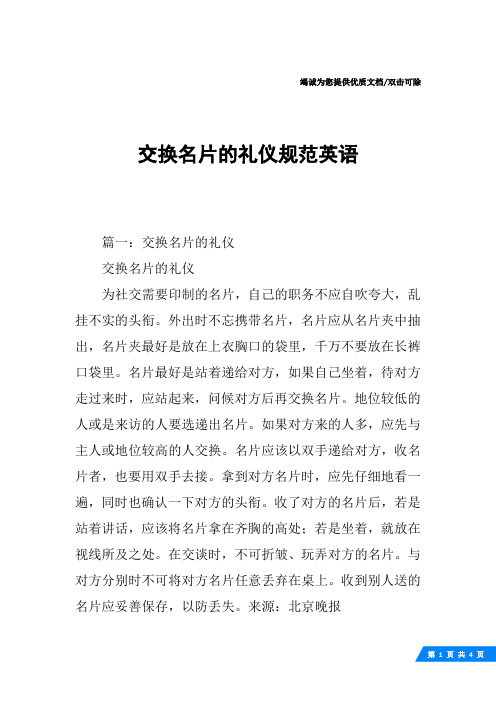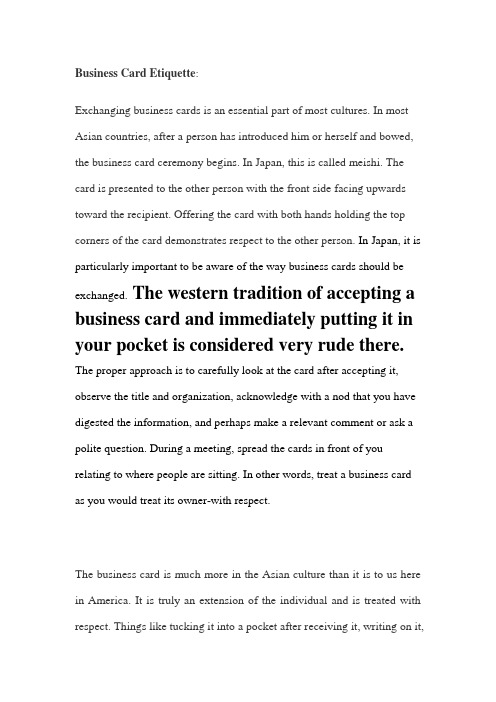交换名片的商务礼仪英语
名片的名词解释英语

名片的名词解释英语名片,又称商务卡片、个人名片,是由个人或企事业单位制作并使用的一种小型印刷品。
名片的主要功能是介绍自己或所属单位的基本信息,用以建立联系和传递关键信息。
在商务场合,名片被广泛使用,成为展示个人和公司形象的重要工具。
在英语中,名片通常被称为“Business card”。
这个术语由“Business”,即“商务”和“card”,即“卡片”组成。
它简洁明了地传达出这个小型印刷品的作用和属性。
英语中关于名片的词汇和概念,涵盖了名片的制作、设计、使用等方面。
首先,我们来看看名片的制作。
英语中用到的词汇有“design”(设计)、“printing”(印刷)、“size”(尺寸)、“paper stock”(纸质)、“logo”(标志)等。
这些词汇揭示了制作名片所涉及的技术和要素。
比如,名片的设计应该具有美观、简洁、独特的特点,以吸引人们的注意。
名片的尺寸通常为标准的88mm x 55mm,但也可以根据个人或企业需求进行调整。
纸质的选择也非常重要,常见的有普通纸、卡纸等,而纸张选择的质地和质量也会影响到名片的整体效果。
此外,名片上的标志(logo)则可以帮助人们更好地识别和记忆名片的来源。
其次,名片的使用和交换在商务活动中非常常见。
在英语中,用到的词汇有“exchange”(交换)、“introduce”(介绍)、“networking”(建立人脉)等。
名片被用于引入自己或公司,帮助人们了解基本信息,并建立联系。
在商务拜访中,交换名片是常规礼仪,可以加深双方的印象和记忆,并为今后的沟通和合作提供方便。
同时,参加各种商务会议和社交活动时,通过交换名片可以扩展自己的人脉圈,建立更广泛的业务关系。
除了基本的制作和使用功能外,名片在英语中也存在一些特殊的概念和衍生用法。
比如,“calling card”(拜访卡)是指在某人的住所留下的一张名片,表达出自己到访过的意思。
同时,“名片交换”在英语中可以说成“exchange business cards”或简化为“exchange cards”,通过动词形式强调交流的过程。
《商务英语口语大全【完整版】》

《商务英语口语大全【完整版】》一、商务问候与介绍1. 问候Good morning/afternoon/evening, it's a pleasure to meet you.(早上/下午/晚上好,很高兴见到您。
)How do you do? I've heard a lot about you.(您好,我久闻大名。
)It's nice to finally put a face to the name.(很高兴能将名字与人对上号。
)2. 自我介绍My name is [Your Name], and I'm the [Your Position] at [Company Name].(我叫[您的名字],是[公司名称]的[您的职位]。
) I'm looking forward to working with you on this project.(我期待与您共事这个项目。
)二、商务洽谈与沟通1. 表达意见In my opinion, [Your Opinion].(在我看来,[您的意见]。
)I believe that [Your Idea] could be beneficial for both parties.(我相信[您的想法]对双方都有益。
)I'd like to suggest [Your Suggestion].(我想提出[您的建议]。
)2. 谈判技巧I understand your concerns, but let's consider the possibilities from another angle.(我理解您的担忧,但让我们从另一个角度考虑一下可能性。
)If we can agree on [Certain Terms], I'm confident that we can finalize the deal.(如果我们能在[特定条款]上达成一致,我相信我们可以完成这笔交易。
日本商务礼仪中英文版

乘车搭乘巴士时,要事先准备好买票的零 钱,上车后投入自动售票机内。日本的巴士 多是前门上后门下。 乘座出租汽车(的士)的方法与中国大 陆、香港、台湾相同。只是出租车门由司机 控制,上下车乘客无须自己关开车门。 乘车乘坐电车之礼时,乘客应在乘车口 处(地上涂有标记)按秩序排队,待车停后 乘客在车门两侧分成两行,等下车乘客下完 后再上车。
称呼:称呼日本人时,必须 要称姓,后面接“san”, 绝不可称名。
Communication etiquette
Position
Chairman President Vice President
Senior Managing Executive Vice Chairman
Managing Director Director Minister Section Chief
与日本人交谈,不要边说边指手划 脚,别人讲话时切忌插话打断。 三人以上交谈时,注意不要冷落大 部分人。 在交谈中,不要打听日本人的年龄、 婚姻状况、工资收入等私事。 禁忌话题是二战
Communication etiquette
Japanese opinion even if they hold a clear, they also avoid the "I think so", "My opinion is this," the direct expression, while the use of "I'm afraid that right?" "I think so to consider, you see do? "This mildly worded, clearly that this expression is appropriate and polite. Expression in the language clearly shows that the consideration to each other and judge left the room, showing that in response to listening to each other, and then express their ideas of a gesture.
中国见面礼仪英语作文

中国见面礼仪英语作文中国见面礼仪英语作文Greetings in ChinaChina with its rich history and diverse culture has a unique set of etiquette rules when it comes to meeting and greeting people. Understanding these customs can be very helpful for anyone visiting or working in China.1. Bowing 鞠躬Bowing is a traditional way of showing respect in China. It is common to bow slightly when greeting someone especially elders or people in higher positions. The depth of the bow can vary depending on the level of respect you wish to convey.2. Handshakes 握手Handshakes are also a common form of greeting in modern China. When shaking hands it is important to make eye contact and smile. A firm grip is preferred but avoid being too aggressive. Remember to wait for the other person to extend their hand first.3. Exchange of Business Cards 交换名片In business settings exchanging business cards is an important part of the greeting process. Present your card with both hands making sure the text faces the recipient. It is polite to take a moment to read the card before putting it away.4. Addressing Others 称呼When addressing someone it is customary to use their title and surname. For example Professor Wang or Manager Li. Avoid using first names unless you have a close relationship with the person.5. Gift Giving 送礼If you are visiting someones home or attending a special occasion it is common to bring a gift. Choose something thoughtful and avoid giving items that are considered taboo such as clocks or anything in sets of four.6. Dining Etiquette 餐桌礼仪When dining with others wait for the host to start eating before you begin. It is polite to use both chopsticks and a spoon and to avoid making loud noises while eating. If you need to use your phone excuse yourself from the table.7. Respect for Elders 尊敬长辈In Chinese culture showing respect to elders is very important. Always stand up when an elder enters the room and offer them a seat. Listen attentively when they speak and avoid interrupting.8. Personal Space 个人空间Chinese people generally have a smaller concept of personal space compared to Western cultures. It is common for people to stand close to each other while talking. However avoid touching someone without their permission.By being aware of these meeting and greeting etiquettes you can navigate social situations in China with more confidence and respect for local customs.中国见面礼仪英语作文中国以其悠久的历史和多元的文化拥有一套独特的见面和问候礼仪规则。
交换名片的礼仪规范英语

竭诚为您提供优质文档/双击可除交换名片的礼仪规范英语篇一:交换名片的礼仪交换名片的礼仪为社交需要印制的名片,自己的职务不应自吹夸大,乱挂不实的头衔。
外出时不忘携带名片,名片应从名片夹中抽出,名片夹最好是放在上衣胸口的袋里,千万不要放在长裤口袋里。
名片最好是站着递给对方,如果自己坐着,待对方走过来时,应站起来,问候对方后再交换名片。
地位较低的人或是来访的人要选递出名片。
如果对方来的人多,应先与主人或地位较高的人交换。
名片应该以双手递给对方,收名片者,也要用双手去接。
拿到对方名片时,应先仔细地看一遍,同时也确认一下对方的头衔。
收了对方的名片后,若是站着讲话,应该将名片拿在齐胸的高处;若是坐着,就放在视线所及之处。
在交谈时,不可折皱、玩弄对方的名片。
与对方分别时不可将对方名片任意丢弃在桌上。
收到别人送的名片应妥善保存,以防丢失。
来源:北京晚报篇二:交换名片的礼仪交换名片的礼仪名片是商务人士的必备沟通交流工具,名片像一个人简单的履历表,递送名片的同时,也是在告诉对方自己姓名、职务、地址、联络方式。
由此可知,名片是每个人最重要的书面介绍材料。
在商务交往中,若想适时地发送名片,使对方接受并收到最好的效果,必须注意下列礼仪细节:1.首先要把自己的名片准备好,整齐地放在名片夹、盒或口袋中,要放在易于掏出的口袋或皮包里。
不要把自己的名片和他人的名片或其它杂物混在一起,以免用时手忙脚乱或掏错名片。
2.出席重大的社交活动,一定要记住带名片。
参加会议时,应该在会前或会后交换名片,不要在会中(交换名片的礼仪规范英语)擅自与别人交换名片。
3.处在一群彼此不认识的人当中,最好让别人先发送名片。
名片的发送可在刚见面或告别时,但如果自己即将发表意见,则在说话之前发名片给周围的人,可帮助他们认识你。
4.不要在一群陌生人中到处传发自己的名片,这会让人误以为你想推销什么物品,反而不受重视。
在商业社交活动中尤其要有选择地提供名片,才不致使人以为你在替公司搞宣传、拉业务。
business card etiquette 跨文化交际中的名片礼仪

Business Card Etiquette:Exchanging business cards is an essential part of most cultures. In most Asian countries, after a person has introduced him or herself and bowed, the business card ceremony begins. In Japan, this is called meishi. The card is presented to the other person with the front side facing upwards toward the recipient. Offering the card with both hands holding the top corners of the card demonstrates respect to the other person. In Japan, it is particularly important to be aware of the way business cards should be exchanged.The western tradition of accepting a business card and immediately putting it in your pocket is considered very rude there. The proper approach is to carefully look at the card after accepting it, observe the title and organization, acknowledge with a nod that you have digested the information, and perhaps make a relevant comment or ask a polite question. During a meeting, spread the cards in front of you relating to where people are sitting. In other words, treat a business card as you would treat its owner-with respect.The business card is much more in the Asian culture than it is to us here in America. It is truly an extension of the individual and is treated with respect. Things like tucking it into a pocket after receiving it, writing on it,bending or folding it in any way, or even looking at it again after you have first accepted it and looked at it are not considered polite and can insult your fellow Asian networker.First encounterWhen European businessmen meet for the first time, they shake hands firmly. New participants in business interactions are introduced to the other persons present at the beginning of the first appointment.∙Titles, first names and last names are mentioned.∙In most European countries, such as Germany, France and Belgium, using courtesy titles and last names is the norm.∙In the UK and in the Netherlands it is not unusual to act on a first-name basis after the first introduction.Business cardsExchanging business cards is one of the most common ways of providing contact details.∙Business cards are usually exchangedat the beginning of the first meeting, so that each participant knows theposition of the others in thecompany.∙If a contact person is absent, alwaysleave a business card behind.∙In Europe, business cards are nothanded over with both hands, but it is not regarded impolite if one does so.CommunicationAlthough most European countries are similar in this matter, each nationality has its own way of communicating.∙Dutch businessmen keep business and private matters strictly separate. When negotiating they are very straightforward and to the point. A no-nonsense approach is used in business interactions and in society. A foreign businessman should not feel offended when a Dutchman says he is wrong.∙Businessmen from the United Kingdom and from Belgium are more careful. They will be very cautious in saying that they disagree and they need time to think things over.∙In Luxembourg first contacts are quite formal. For Luxembourgian businessmen it is important to know that the business partner is not passing through, but that he has chosen the country for itsindividual characteristics.∙In Germany and France people are more distant and formal. French people do not use first names, and one must persevere to gain their trust.∙Most Europeans have a good sense of humour. Laughing loudly and self-mockery is not considered as impolite.AppointmentsIn most European countries it is very important to be on time, but due to increasing traffic on the roads it occurs more often that people are delayed.∙Arriving late at a meeting can be regarded as an insult. Thus, any delay must be notified immediately.∙In France it is recommended to confirm appointments to be sure that the French business partners will be present.Business lunches and dinnersBusiness lunches and dinners form a crucial part of the business interaction process both in Europe and in China.∙Most Europeans enjoy dining sumptuously. Several courses and a significant amount of time may pass before business topics arebrought up.∙More informal relationships may be established during business lunches and dinners. Subjects for conversation are family life, culture, sports and politics.∙In Europe strict table manners are required. For instance, making noises while eating is considered very impolite.∙Most European countries have a diversified culinary culture supplemented with foreign cooking. There are, for instance, many Chinese restaurants. France is famous for its wine productionwhereas Belgium and Germany are known for their beer breweries.∙If one is invited for dinner at someone’s home, normally a small present is brought along. In that case, it is polite to send a letter of thanks the day after the dinner.LanguagesEnglish is widely spoken in all European countries, but each country is proud of its own national language as well. Therefore, it might be interesting to know how to greet the other person in his own language. Sometimes business cards are translated into English and adapted to the style and usage of the country one is doing business with.An overview。
商务名片礼仪的介绍-英文-business-card-etiquette
2021/3/10
讲解:XX
2
The definition of business card
1. Business card is a little card that which including the name, title, contact information , photo etc. It can be used for introducing sb or company to others.
3) the card can not include more than two titles
2021/3/10
讲解:XX
4
The etiquette of exchanging business card:
1. Handing business card
1) Observing the will and seizing the moment
讲解:XX
16
5) language (宜用汉语简化字,可酌情使用少数民族文字和外文。) 6) typeface (标准、清晰、易识的印刷体为好。) 7) printing methods (铅印或胶印,最好不要手书自制或复印、油
或影印。)
8) format (横式或竖式。)
2021/3/10
讲解:XX
2021/3/10
讲解:XX
3
2. Three notes of using business cards:
1) the card can not be altered arbitrarily
2) the card does not provide private residential phone number
交换名片实用英语口语范文
交换名片实用英语口语范文名片是商务交际中极重要的工具,它常被看作是公司或个人的广告。
递名片时,应双手或右手捏住名片的两角或一个角。
千万不要用食指或中指夹着名片给人。
接受他人名片时,应恭敬的说声“谢谢”。
接到名片后可当即阅读并请教不明之处。
对话背景:布朗先生和何先生被邀请参加电子商品联合会举行的宴会。
他们彼此不认识。
他们交换了名片。
B: Mr. BrownH: Mr. He PengH: Good evening. I don’t think we’ve met before. My name i s He Peng.晚上好。
我想我们以前没见过面。
我叫何鹏。
B: Hi, I’m Peter Brown. Pleased to meet you, Mr. He.嗨,我是彼得·布朗。
很高兴见到你,何先生。
H: Pleased to meet you, too. I work for Dalian Electronics Imp. & Exp. Corporation. Here’s my card.(He双手递名片给Brown)我也很高兴见到你。
我在大连电子进出口公司工作。
这是我的名片。
B: Thank you. Er, Excuse me, Mr. He? Is this telephone number also your fax number?谢谢您。
呃,打扰一下,何先生?这个电话号码也是你的传真号码吗?H: Yes, You can fax me by dialing this number. At the back of the card is our business scope for your reference.(停顿一下)How can I get in touch with you, Mr. Brown?是的,你可以拨这个号码传真给我。
名片背面是我们的经营范围,供您参考。
国际商务礼仪(第二版) Unit Six Business Card Etiquette
An inexpensive, internationally recognized means of representing yourself to business associates and of conveying contact information to them.
B. English. C. Mandarin. D. French
5. Your card must have your company’s name. A
A. True. If you have a card, the company’s name is a must!
B. False. It’s recommended, but not needed.
根据题目要求每个小组自行设计制作一张简单的商务名片然后每位同学练习名片发送接受等各个环节掌握商务名片发送礼仪
Unit Six. Business Card Etiquette
Focal Points
Lead-in Business Card Etiquette How to Exchange Business Cards International Business Card Protocols Exercises
leader of the group first. ◊ Presenting a card with two hands. It’s best
to hold the card by the two upper corners. ◊ Receive a business card with both hand,
A. A few days.
B. A few minutes.
商务英语特点及语言特色
商务英语特点及语言特色商务英语是专门用于商务交流和商务活动的英语。
它具有以下特点和语言特色:2.准确性:商务英语要求准确无误的沟通和表达。
商务场景下的交流需要使用精确、明确的语言,以确保信息的准确传达和理解。
商务英语中有许多专业术语和商务惯用语,需要掌握并正确运用。
3.专业性:商务英语是一门专业性较强的英语。
它有自己的语法、词汇和表达方式。
商务英语中的词汇通常与商务活动和商务领域相关,如市场营销、人力资源、国际贸易等。
掌握商务英语要求对商务知识和业务流程有一定的了解。
4.语言形式简练:商务英语更注重信息的传达效果,不追求过多的修饰和夸张。
商务英语注重表达的简洁明了,避免歧义和模糊性。
商务信函、商务报告、商务演讲等语言形式都较为简练,以便快速传递信息和意图。
5.跨文化交流:商务英语常用于跨国企业和国际贸易中,需要处理不同国家和文化的交流。
因此,商务英语注重跨文化交流能力的培养,要求商务人员具备跨文化意识、了解各国商务礼仪和文化差异,并能够与不同文化背景的人进行有效的交流。
商务英语的语言特色可以体现在以下几个方面:1. 商务词汇:商务英语中有大量的商务词汇,如“marketing”(市场营销)、“negotiation”(谈判)、“investment”(投资)等。
这些词汇是商务交流的基础,商务人员需要掌握并正确运用这些词汇。
2. 商务惯用语:商务英语常使用一些惯用语,如“to close a deal”(达成交易)、“to make a proposal”(提出建议)等。
这些惯用语能够准确、简洁地表达商务意图和行为,提高交流效果。
3. 商务礼仪:商务英语中涉及到商务礼仪的表达,如“to exchange business cards”(交换名片)、“to offer a toast”(敬酒)等。
商务人员需要了解不同国家和文化的商务礼仪,以避免冒犯他人。
4.正式语言:商务英语通常要求使用正式语言,避免使用口头语和俚语。
- 1、下载文档前请自行甄别文档内容的完整性,平台不提供额外的编辑、内容补充、找答案等附加服务。
- 2、"仅部分预览"的文档,不可在线预览部分如存在完整性等问题,可反馈申请退款(可完整预览的文档不适用该条件!)。
- 3、如文档侵犯您的权益,请联系客服反馈,我们会尽快为您处理(人工客服工作时间:9:00-18:30)。
竭诚为您提供优质文档/双击可除交换名片的商务礼仪英语
篇一:商务礼仪之交换名片
商务礼仪之交换名片的礼仪1)要养成检查名片夹内是否还有名片的习惯,名片的递交方式:各个手指并拢,大拇指轻夹着名片的右下,使对方好接拿。
双手递给客户,将名片的文字方向朝客户。
(2)拿取名片时要双手去接,拿到名片时轻轻念出对方的名字,以让对方确认无误;如果念错了,要记着说对不起。
拿到名片后,要放置自己名片夹中。
(3)同时交换名片时,可以右手提交名片,左手接拿对方名片。
(4)不要无意识地玩弄对方的名片。
(5)不要当场在对方名片上写备忘事情。
(6)上司在旁时不要先递交名片,要等上司递上名片后才能递上自己的名片。
(7)送名片的礼仪:应起身站立,走向对方,面含笑意,以右手或双手捧着或拿正面面对对方,以齐胸的高度不紧不慢的递送过去。
与此同时,应说“请多关照”,“请多指教”“希望今后保持联络”等,同时向多人递送名片时,应由尊而卑或由近而远。
(8)接受名片的礼仪:要起身站立,迎上前去,说“谢谢”。
然后,务必要用右手或双手并用将对方的名片郑重的接过来,捧到面前,念一遍对方的姓名。
最后,应当着对方的面将名片收藏到自己的名片夹或包内,并随之递上自己的名片。
忌讳:用左手接,接过后看也不看,随手乱放,不回递自己的名片等。
篇二:第三章英语交流中商务礼仪
第三章商业礼仪
一、初次会见客户meetingwithapotentialclient
学习完本单元之后,你将对以下礼节有深入的了解:
如何自我介绍、乘车礼节、与初遇之客户聊天的话题、如何邀约客户。
--------------------------------------------------------------------------------
英文正文
--------------------------------------------------------------------------------
b:excuseme.Areyoums.Joanbutler?
J:Yes,Iam.FromnorthernVancouverofcanada.Andareyoumr .sun?
b:no,maam,Imnot.ImDavidTaylor,salesmanageratAlexTra ding.hi.mr.sunaskedmetocomeandmeetyou,becausehewasu nexpectedlytiedupthismorning.hesveryeagertomeetyou, andhesendshiswarmestregards.
J:Isee.well,itsverynicetomeetyou,David.Andplease,fe elfreeto(:交换名片的商务礼仪英
语)callmeJoan.Imnotbigonformalities.
b:Itwouldbemypleasure.mayIhelpyouwithyourbags?wehav eacarwaitingoutside.Ihopeyouhadapleasantflightover, Joan.
J:Thisonewasuneventful,exceptforalittleturbulencehe reandthere.Infact,Ifeelascrispasanewdollarbill.
b:gladtohearit.wouldyoulikeaninformaldinnerwithusto night?mr.sunaskedmetoinquire.
J:Itsveryniceofhim,buttruthfullyIdratherjustspendaq uieteveninginthehotel.mr.sunwontmind?
b:notatall.heexpectedyoudwantalittleRandRfirst.Just toconfirm,youknowthattomorrowsmeetingisscheduledfor 10a.m.atouroffices?Illpickyouupatthehotelat9:15.
J:Thatllbefine.David,thankyousomuch.
b:Itsmypleasure.bytheway,arethereanysightsyoudliket oseewhileyourehere?
J:well,Ihaveinstructionsnottomixbusinesswithpleasur eonthistrip.butcouldweseetheworldTradecenter,andthe economicdevelopmentzone?
b:Thatsnoproblem.Illsetupappointmentsforlaterthiswe ek.
J:Thankyouverymuch.
--------------------------------------------------------------------------------
中文翻译
--------------------------------------------------------------------------------
b:您好,您是Joanbutler女士吗?
J:我是来自加拿大北温哥华。
您是孙先生吧?
b:不,我不是。
我是DavidTaylor,Alex贸易公司的业务经理。
您好,孙先生要我来接您,因为他今早突然有事无法分身。
他非常想见您,要我先代他向您致意。
J:原来如此。
我非常高兴认识您,David。
叫我Joan就可以了,我是不拘小节的。
b:这是我的荣幸。
让我帮您提行李好吗?我们有辆车在外面候驾。
Joan,您来华的这趟旅途还愉快吧!
J:除了偶尔的气流不稳定,一路都很顺利。
老实说,我觉得自己还是很有精神的。
b:很高兴听您这么说,这是不是说您今晚可以让我们招待便饭?孙先生要我问一声。
J:他太客气了!不过事实上我情愿在饭店休息一晚,孙先生不会介意吧?。
